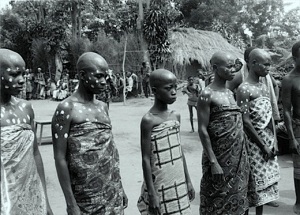 Even if the old woman has no teeth, her tiger nuts remain in her own bag. Ghanaian Proverb
Even if the old woman has no teeth, her tiger nuts remain in her own bag. Ghanaian Proverb
I have absolutely no idea what this proverb means but it makes me chuckle so I‘ve decided to use it.
You will notice that I’ve skipped Georgia on the way to Ghana. This is because finding a book for Georgia was incredibly tricky. If you google ‘Georgian novelists’, ‘Georgian literature’ etc. you get literally (and I mean literally literally) thousands of hits for Jane Austen, or writers from the state of Georgia in the U.S.A. By the time I’d worked out that putting ‘contemporary’ in front of the search terms elicited more meaningful results, I was getting a little jaded. Then, by happy coincidence, a friend’s husband decided to spend 6 months in Georgia (the country not the state), as he wants to learn Georgian. He’s delighted to offer his services as a guest blogger on his return so that lets me off the hook.
As for Ghana, I was totally hooked by Kwei Quartey’s Wife of the Gods. This is a book for crime fanatics as much as for those who like to read ‘foreign’ literature. If you are a crime fanatic, you’ll understand the pleasure of finding a whole new series to get one’s teeth stuck into and a new detective to follow. In Wife of the Gods, Quartey gives us a detective to love. Darko Dawson is a smart, haunted, dope smoking, family man with a chronically ill child and an overbearing mother-in-law. This, the first Dawson novel, throws us full-force into Dawson’s world of Accra, to wit – the big city, the traffic problems, nepotism in the police department, and the ever-present worry of his child’s sickness and the treatments he can never afford. This city part of the novel reads like any other crime book. There is nothing exotic or different about Accra, it’s a city that feels familiar, Dawson and his family could be a family anywhere, they deal with things in the way that any one of us might. And then, and this is the real joy of the book, Dawson is sent to a small town to investigate the death of a young woman, a promising medical student. In this small town environment we encounter another Ghana and another Dawson. This is the Ghana of witch doctors and herbal medicines, of teenage girls being offered as wives to fetish priests to mollify angry gods (the eponymous wives of the Gods). And this is a Dawson full of rage, and modernising zeal, as violent and brutal as the landscape in which he finds himself. It is here that we realise that Ghana is both a modern and antique place, a place as contradictory as Dawson himself.
Everything about this novel is believable. The plotting is clever, the characters are well developed, the power struggles positively thrum as though Quartey is telling us something important. Furthermore, there are no irksome coincidences, and even the witch-doctory storylines arise out of more straightforwardly sinister human impulses, never veering off into magical realism. Nothing feels shoehorned into the story, themes and ideas, cultural exposition and historical explanations are simply and effortlessly there as a necessary part of the whole.
Posted on September 24, 2014
0